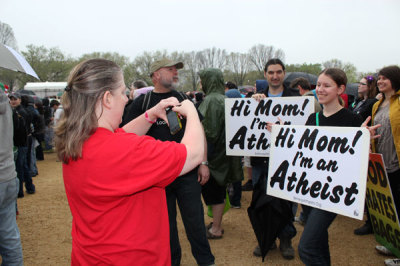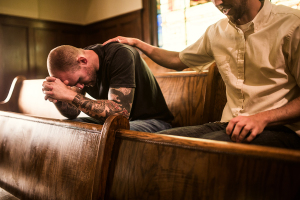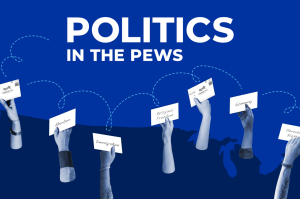Atheism is declining, says report; what should Christians do?

A few months ago, the good folks at the Center for the Study of Global Christianity released the 2019 edition of their “Status of Global Christianity” report. There’s a lot of fascinating info in there. Some of the more significant stats are detailed in the LifeWay article, 7 SURPRISING TRENDS IN GLOBAL CHRISTIANITY IN 2019, like the fact that Christianity is growing faster than the population is, or that the percentage of unevangelized individuals in the world has shrunk, from 54.3% in 1900 to 28.4% today.
Perhaps most fascinating, though, is the projected decrease in atheism worldwide. According to the report, atheism reached its peak in 1970, with over 165 million atheists worldwide. Since then, atheism has been steadily decreasing, with 138 million today, a number that’s expected to drop to 129 million by 2050. That’s huge. Right?
Well…it’s important, when reading stats like this, to take into account the host of other statistics that complexifies the issue. For instance, a 2015 study from Pew Research showed that while the number of nonbelievers will likely shrink over the next 25 years, this decline will not be evenly distributed: Europe, America and China will continue to move away from religion while Christianity grows exponentially in Sub-Saharan Africa, resulting in what researcher Alan Cooperman calls “the secularizing West and the rapidly growing rest.” We also can’t forget that Millennials are three times as likely to consider themselves atheists when compared to Baby Boomers.
In other words, atheism may be projected to decline, but don’t get the party hats out just yet, believers. There are a lot of factors at play.
So what should Christians do with this information? I was joking about the party hats, but for many Christians, that’s not too far from the truth. Somewhere along the way, atheists became the rival team. They’re the villains in Christian movies. They’re the kids we warn our kids to be careful around. They’re the “white whale” of evangelism, the biggest catch you can reel in. They’re a nice thing to have been—we’re very proud that C.S. Lewis and journalist Lee Strobel used to be atheists because it demonstrates that, hey, intelligent people can find their way to God, too!—but they’re a horrifying thing to currently be. So, when you hear that atheism is going to drop in the next few decades, maybe you breathe a sigh of relief, without necessarily knowing why.
Or maybe you know exactly why. Maybe you believe that atheists should be feared because there is nothing more detrimental to the moral fabric of our world than someone who has no god.
You wouldn’t be alone in this idea. It’s an old one. John Locke, an English philosopher who argued for religious liberty, wrote in 1689 that “those…who deny the being of God” should not be tolerated because “promises, covenants and oaths which are the bonds of human society can have no hold on [them]…” This understanding was baked into the founding of America. James Madison, a Founding Father and the fourth president, wrote in 1785 that “before any man can be considered as a member of Civil Society, he must be considered as a subject of the Governor of the Universe…” This would seem to exclude people who don’t believe in any “Governor” at all.
Throughout the eighteenth and nineteenth centuries, atheism was linked with radical ideas and dangerous behavior. Witches were atheists. The suffragette Elizabeth Cady Stanton was supposedly agnostic. Leon Czolgosz, the man who assassinated President McKinley in 1901, had renounced his Catholic beliefs. America’s fear of atheism culminated in the twentieth century with Cold War hysteria. “From the root of atheism stems the evil weed of communism,” politician Louis Rabaut argued before Congress in 1954. “Unless we are willing to affirm our belief in the existence of God…[we] open the floodgates to tyranny and oppression.” (Over the next three years, America would hold its first prayer breakfast, add “under God” into the Pledge of Allegiance and stamp “In God We Trust” on all currency.) These antipathies toward atheists still linger today.
Maybe that’s why, when Christians hear that atheism is diminishing, they feel like celebrating. Ding dong, the witch is dead! A point for the home team. But is that the best response, I wonder. Or is there a, dare I say, more “Christian” response?
I think there might be. First off, as we’ve already seen, this issue is not black and white; it’s far more complex than simply one team losing and the other team winning. For instance, one of the complicating factors that Christians would do well to explore is the fact that many Millennials, despite moving away from traditional belief, still consider themselves spiritual. In 2017, students from Harvard Divinity School released this tremendous study that explored the ways that Millennials are creating new forms of spiritual community. The study points to organizations like Crossfit, SoulCycle, The Millennial Trains Project and the Harry Potter Alliance, groups that “use secular language while mirroring many of the functions fulfilled by religious community,” including “fellowship, personal reflection, pilgrimage, aesthetic discipline, liturgy, confession and worship.” I don’t know about you, but I find this profoundly encouraging. To me, I see this study as evidence that human beings can’t get away from their need for something bigger. We have “restless” hearts, to quote St. Augustine.
My hope would be that, starting immediately, Christians would not assume that Millennials are void of all religious impulse. In fact, quite the opposite: Millennials are in desperate need of purpose and connection, so much so that they’re forging their own. Christians would do well to acknowledge them.
Second, and last, I think it’s high time for the war between Christians and atheists to end. I know it’s a two-sided conflict—I can picture the face of many a smug atheist, and I’m sure you can, too—but someone has to lay down their arms, and who better than those called to “turn the other cheek?” Atheists are not the enemy, folks. Sin is. Human frailty and pride is at the “root” of all “evil.” But not a particular group of people.
As usual, whenever we turn people into a monolith, that’s when we get into trouble. We make assumptions that may or may not be true. We fear them. We avoid relationships, because we’re afraid that we’ll lose our faith as a result. The truth is, obviously, God is bigger than atheism. God is big enough for you to befriend an atheist.
And you better do it quickly, too. Apparently, atheism is in decline. And how much a bummer would that be, to not have befriended an atheist when you had the chance?
LightWorkers’ mission is to create engaging, uplifting and inspirational content that breaks through the clutter, building a community of sharing and igniting a movement in the real world that motivates people to celebrate and share the good all around them.



























